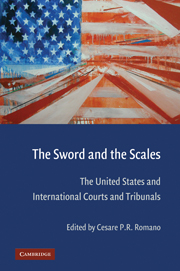Book contents
- Frontmatter
- Contents
- Preface
- Acknowledgments
- Abbreviations
- Contributors
- 1 International Courts and Tribunals and the Rule of Law
- 2 American Public Opinion on International Courts and Tribunals
- 3 Arbitration and Avoidance of War: The Nineteenth-Century American Vision
- 4 The United States and the International Court of Justice: Coping with Antinomies
- 5 The U.S. Supreme Court and the International Court of Justice: What Does “Respectful Consideration” Mean?
- 6 U.S. Attitudes toward International Criminal Courts and Tribunals
- 7 The United States and the Inter-American Court of Human Rights
- 8 From Paradox to Subsidiarity: The United States and Human Rights Treaty Bodies
- 9 The U.S. and International Claims and Compensation Bodies
- 10 Does the United States Support International Tribunals? The Case of the Multilateral Trade System
- 11 The United States and Dispute Settlement under the North American Free Trade Agreement: Ambivalence, Frustration, and Occasional Defiance
- 12 Dispute Settlement under NAFTA Chapter 11: A Response to the Critics in the United States
- 13 The United States and International Courts: Getting the Cost-Benefit Analysis Right
- Index
- References
5 - The U.S. Supreme Court and the International Court of Justice: What Does “Respectful Consideration” Mean?
Published online by Cambridge University Press: 05 June 2012
- Frontmatter
- Contents
- Preface
- Acknowledgments
- Abbreviations
- Contributors
- 1 International Courts and Tribunals and the Rule of Law
- 2 American Public Opinion on International Courts and Tribunals
- 3 Arbitration and Avoidance of War: The Nineteenth-Century American Vision
- 4 The United States and the International Court of Justice: Coping with Antinomies
- 5 The U.S. Supreme Court and the International Court of Justice: What Does “Respectful Consideration” Mean?
- 6 U.S. Attitudes toward International Criminal Courts and Tribunals
- 7 The United States and the Inter-American Court of Human Rights
- 8 From Paradox to Subsidiarity: The United States and Human Rights Treaty Bodies
- 9 The U.S. and International Claims and Compensation Bodies
- 10 Does the United States Support International Tribunals? The Case of the Multilateral Trade System
- 11 The United States and Dispute Settlement under the North American Free Trade Agreement: Ambivalence, Frustration, and Occasional Defiance
- 12 Dispute Settlement under NAFTA Chapter 11: A Response to the Critics in the United States
- 13 The United States and International Courts: Getting the Cost-Benefit Analysis Right
- Index
- References
Summary
For those interested in the attitudes of U.S. courts toward international tribunals, the 2005–6 Supreme Court term was slated to be a watershed moment. The nascent dialogue between the U.S. Supreme Court and the International Court of Justice (ICJ) over consular notification – begun eight years earlier – was expected to reach its apex in Sanchez-Llamas v. Oregon. In a series of decisions, the ICJ had held that the United States had violated its obligation, under Article 36 of the Vienna Convention on Consular Relations, to notify foreign nationals detained by the police of their right to contact their countries' consulates. Moreover, the ICJ had ruled that the application of procedural default rules to consular notification claims violated Article 36 because it failed to give “full effect” to the purposes underlying the treaty. As a remedy for the treaty violation, the ICJ prescribed “review and reconsideration” of criminal proceedings involving consular notification claims that had been held by U.S. courts to be procedurally defaulted. Supreme Court watchers widely expected the Court in Sanchez-Llamas to decide what judicial deference, if any, was due the ICJ's interpretation of the Vienna Convention. More broadly, at stake was the extent to which the Supreme Court would choose to participate in dialogue on matters of treaty interpretation – and precisely what that dialogic relationship would look like – both with the ICJ and with the rapidly proliferating numbers of other international tribunals.
- Type
- Chapter
- Information
- The Sword and the ScalesThe United States and International Courts and Tribunals, pp. 112 - 130Publisher: Cambridge University PressPrint publication year: 2009



